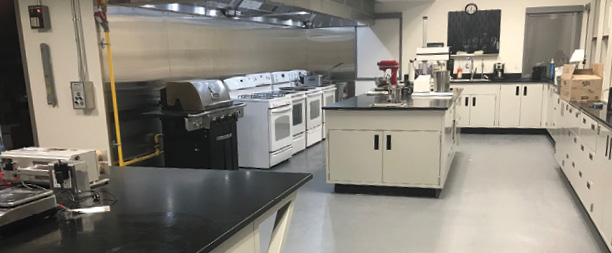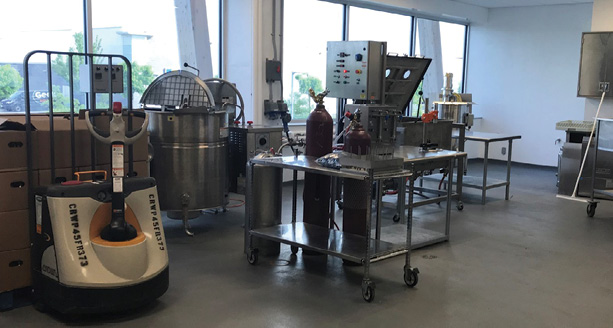
Overcoming the challenges of incorporating cannabis ingredients – from our new issue
Food in Canada Staff
Products Specialty Foods cannabis food products ingredients NSF
Working with cannabis is no easy feat for manufacturers, and often requires third-party expertise, says Leanne Blommaert, technical manager, NSF Canada.
“As a passionate innovator with NSF Canada, the idea of creating a new product with a new or novel ingredient gets my heart racing. There’s nothing I love more than being creative! But formulating with any new ingredient brings new challenges to the lab bench.
In October 2018, Canada became the first major world economy to legalize recreational cannabis. Just one year later, these regulations were extended to authorize the legal production and sale of edible cannabis. Excited manufacturers and developers immediately began experimenting with cannabis in food and beverage products. But, as with any new ingredient, the introduction of cannabis to the food and beverage industry presented a new set of challenges, most notably stability, efficacy and taste.
Why cannabis is so challenging
Cannabinoids are lipophilic molecules, which means they don’t dissolve in water. This presents a challenge for companies looking to incorporate cannabis into new products that don’t contain fats or oils. Cannabis beverage development poses a particularly challenging problem, as separation or settling of the cannabinoids occurs in the finished product. To address this, manufacturers have tried using emulsifiers and surfactants to decrease separation; however, the resulting product is typically cloudy due to the emulsification and stability is limited. Eventually, these products will separate, requiring consumers to shake or stir before consuming. Recently, the use of nano emulsions and micro emulsions have shown much more promising results, delivering finished beverages that are clearer and more resistant to separation. Aqueous dispersible concentrates use microencapsulation and dry the finished product into a fine powder which is water soluble. Some cloudiness is still evident in the finished product however, and stability of aqueous dispersible concentrates can be variable.
When producing infused edibles, consistency is key. Consumers are looking for a predictable, repeatable experience with consistent dosing. To ensure efficacy, manufacturers of edible cannabis must purchase their cannabis concentrates from a reputable company that follows strict standards for extraction and standardization. Having a consistent concentrate is the first step to ensuring consistency in the finished product. The method of incorporation of the cannabis ingredient, the development of standardized formulas, the particle size of inclusions and the enforcement of solid quality practices to monitor both production and the homogeneity of the finished product are all critical steps in developing an infused edible product that delivers consistent effects.
Taste and more
We have all heard the saying “taste is king” and cannabis edibles are no exception. Terpenes are the organic molecules that are the building blocks for the taste and smell. Cannabis contains over 100 identified terpenes, with profiles ranging from earthy to spicy, cheesy to sweet and everything in between. Understanding terpenes and choosing cannabis strains that have terpene profiles that are complementary to the product being developed is important in creating a balanced finished product. Using distillates in the development of cannabis edibles can also be beneficial as they typically have a cleaner, more neutral flavour profile. Whether using extracts or distillates, it’s important for manufacturers to understand the terpene profile and choose wisely to avoid unbalanced “off” flavours.
What NSF offers
Overcoming these challenges is no easy feat for manufacturers and often requires third-party expertise from a trusted partner. Since receiving a cannabis research license from Health Canada, our dedicated team of food scientists here at NSF Canada can offer innovation product development and process development services to makers of cannabis products manufactured and sold in Canada. NSF also offers shelf-life testing services and stability testing.
When paired with sound scientific principles and technical expertise, the product development expertise offered by NSF Canada and other qualified consultants can help cannabis manufactures overcome challenges and bring their edible ideas to market. Such qualified experts can assist clients with all aspects of development of edible cannabis products and beverages, including formulation development, process development, flavour optimization and ingredient selection.
Lab-scale trials are an important step in the commercialization process of any product launching in the marketplace, and cannabis edibles are no exception. The ability to test a formulation to determine the impact of scale-up on ingredients, texture, colour, stability and processing offers an opportunity to adjust formulas and procedures before full-scale production. NSF Canada’s processing laboratory, for example, uses mobile pilot-scale equipment to help makers of cannabis products transition the gap between benchtop development and full-scale production. NSF Canada also offers manufacturing support for scale-up and plant trials, combining our strong technical knowledge and creative problem-solving approach to help clients and manufacturers troubleshoot any in-plant issues.
The advancement in technology and information related to cannabis ingredients in edible food products is happening quickly and keeping up with the latest developments can be challenging. Utilizing expert partners with product lifecycle experience, from product concept through commercialization, can help cannabis companies navigate the ever-changing landscape and launch edible cannabis products that consistently meet consumer expectations.
Print this page

